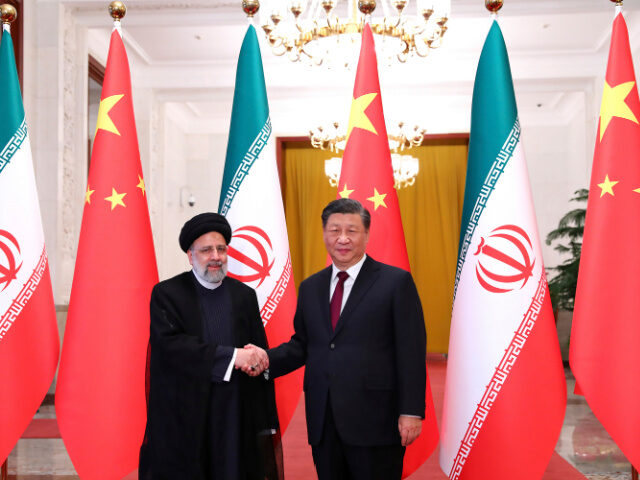Chinese dictator Xi Jinping and his Iranian counterpart Ebrahim Raisi published a joint statement on Thursday affirming their desire to “boost cooperation in the battle against terrorism,” as well as strengthen commercial and national security ties.
Raisi concluded a three-day visit to Beijing on Thursday in which he met with Xi and attended several events with Chinese regime-approved business leaders and Iranians working in China. Xi and Raisi last met during the Shanghai Cooperation Organization (SCO) summit in Uzbekistan in September, where Xi reportedly extended the invitation.
Xi, reports from Chinese and Iranian state media said on Thursday, accepted an invitation from Raisi to visit Iran on an undetermined day.
China and Iran are close ideological and geopolitical partners, endorsing each other’s human rights abuses at global platforms such as the United Nations. Iran is the world’s foremost state sponsor of terrorism, heavily funding global jihadist groups such as the Shiite terrorist organization Hezbollah and widely believed to have orchestrated the deadliest terrorist attack in the Western Hemisphere before September 11, 2001 – the 1994 bombing of the Argentine-Israeli Mutual Association (AMIA) in Buenos Aires.
The Chinese Communist Party regularly claims extreme concern over “terrorism” but largely uses the term as cover for its ongoing genocide of majority-Muslim people indigenous to occupied East Turkistan, the majority of whom are ethnic Uyghurs. Beijing claims that East Turkistan is home to a jihadist group called the “East Turkistan Islamist Movement,” (ETIM), which the United States removed from its foreign terrorist organization list in 2020 on the grounds that it could find no evidence that the group was real.
Iran and China share similar concerns about terrorism and vow to cooperate to defeat it, the Iranian state outlet PressTV cited the joint statement as saying on Thursday.
“The two presidents [Xi and Raisi] agreed to boost cooperation in the battle against terrorism in order to promote regional and international peace and security,” PressTV detailed, “and agreed to consult in the field of counter-terror efforts and discuss a joint political mechanism to fight terror-related issues.”
The joint statement as posted on the Chinese Foreign Ministry website celebrates the alleged “contributions and sacrifices” made by Iran and China in fighting terrorism and affirms a will to “condemn all forms of terrorism.”
“The two sides condemn all forms of terrorism, oppose any terrorist attacks against civilians, oppose ‘double standards’ on the issue of counter-terrorism,” the statement reads, “and oppose linking terrorism with specific ethnic groups and religions, and advocate the elimination of terrorism by developing and encouraging moderate and moderate ideas.”
“The two sides are willing to hold bilateral consultations on anti-terrorism issues and explore the establishment of a bilateral anti-terrorism political consultation mechanism,” the statement concludes the topic.
Elsewhere, Iran agreed to support China’s Belt and Road Initiative (BRI), a global infrastructure plan in which China offers predatory loans to poor countries as a means of eroding their sovereignty. In exchange, China offered its full-throated support for the Joint Comprehensive Plan of Action (JCPOA), known informally as the Iran nuclear deal, which America withdrew from in 2018. China is one of the original signatories to the JCPOA, which failed in large part due to Iran’s repeated violations of the agreement, and Xi had emphasized his support for the deal’s return in his first meeting with Raisi on Tuesday.
The statement concluded by revealing that Raisi invited Xi to Iran and Xi had accepted.
“Going forward, China will remain a contributor to peace, development and stability in the Middle East and continue to play a constructive role in its lasting peace, security and prosperity,” Chinese Foreign Ministry spokesman Wang Wenbin said on Friday, responding to questions from reporters on Raisi’s visit.
Wang appeared to hint at the fact that Iran has many rivals in its own neighborhood, most prominently Saudi Arabia, whose royal family has invested heavily in the past year in improving ties with China.
“China has friendly ties with all Middle East countries. In our own way, we have been supporting them in resolving differences and cultivating good-neighborliness and friendship,” Wang claimed. “In recent years, China has put forward a series of initiatives aimed at promoting peace and stability in the region. … Regional countries have attached importance to and welcomed these initiatives.”
Saudi Arabia hosted a meeting of the Gulf Cooperation Council (GCC) in Riyadh on Thursday, just as Raisi left China, dedicated to relations with Iran. The U.S. State Department, which participated in the meeting, published a statement noting that regional powers agreed with Washington regarding having “grave concerns” about Iran’s state sponsorship of terrorism.
“The United States and GCC member states condemned Iran’s continued destabilizing policies, including its support for terrorism and the use of advanced missiles, cyber weapons, and Unmanned Aircraft Systems (UAS),” the statement reads, “and their proliferation in the region and around the world.”
“Iran and its proxies and partners have used these Iranian weapons in attacks striking civilians, critical infrastructure, and international maritime shipping,” the statement affirms. “The United States and GCC member states affirmed that Iran’s ongoing proliferation of weapons to state and non-state actors poses a grave security threat to the region and the entire world.”
The State Department does not make any mention of China in its readout.
Iran had expressed ire with China just two months ago for the Communist Party’s continued friendly exchanges with the Gulf Cooperation Council (GCC). Iran summoned the Chinese ambassador to Tehran in December to protest Xi’s visit to Saudi Arabia that month, where he met with GCC leaders and, according to a GCC statement, opposed Iran’s claims to three islands also claimed by the United Arab Emirates (UAE). That dispute did not arise in any public statements during Raisi’s time in Beijing.
Follow Frances Martel on Facebook and Twitter.

COMMENTS
Please let us know if you're having issues with commenting.